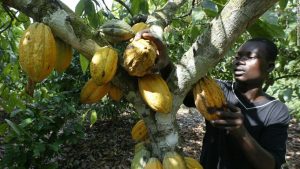
Accra, February 26, 2018//-The recent fall in cocoa bean prices on the world market, has become a major concern to governments, farmers, consumers and products of cocoa products in the West African sub-region.
The sub-region’s is the home to the world leading producers of cocoa-Ivory Coast and Ghana. Nigeria produces the commodity in a small quantity.
So, the current decrease in the world cocoa price from $3,100 to $1, 483 per tonne as of last week is putting burden on the economies of these West African economies.
Cocoa roads projects underthreat
“Unfortunately, this network of roads has suffered from deliberate, unproductive propaganda. It is hard to believe that, at a time when cocoa prices were going down, contracts were awarded for three sections of the road to be funded by COCOBOD. It comes as no surprise that COCOBOD has issued directives to suspend work on all three sections, which come up to almost 100 kilometres”, President Nana Addo Dankwa Akufo-Addo said in his recent State of the Nation Address (SONA).
The Chief Executive Officer of Ghana Cocoa Board (COCOBOD), Joseph Boahen Aidoo said: “As producers struggle to survive the cutting effect of low incomes from the commodity, both producers and consumers stand to suffer the long-term damage, if we fail to adopt measures today to remedy the situation”.
He continued the existing problems of the cocoa swollen shoot virus disease at its endemic levels, over-aged cocoa farms, pests and other diseases, are being compounded by the current low cocoa price issue.
However, with Government’s support, COCOBOD has put in place measures to assist cocoa farmers to increase their farm products as strategic response to reduce the impact of the low cocoa prices on producer income.
Mr. Aidoo said, their main focus is to treat the farms affected by deadly swollen shoot diseased and as well as offer extension services based on good agricultural practices, raise productivity and restore confidence in farmers.
The COCOBOD CEO however said, the Sustainable Smallholder Agri-Business (SSAB) project which would be ending by end of this year, has been very useful to cocoa producers where adoption rate has been over 70%, and its goal is to help 404,600 male and female smallholders, mainly in cocoa growing areas of Ghana, Nigeria, Togo, the Ivory Coast and Cameroon, to sustainably improve their incomes and food supplies from diversified production.
“We have initiated the process to incorporate the Farmer Business School/Cooperative Business School modules in the curricula of the Bunso Cocoa College to ensure the Sustainability of the programme,” he noted.
According to him, the SSAB programme coincides with the difficult times in the cocoa industry’s modern history when prices consistently fell to threaten the sustainability of supply and survival of producers.
Meanwhile, Mr. Aidoo indicated that, Ghana’s cocoa industry employs a significant number of the population, by meeting the livelihood needs of over 800,000 families and over thousands of workers in the value chain.
“As we produce, we must be innovative in our handling of the challenges that confront the industry to survive the rapidly changing market environment. One of the several available strategist is to explore synergies with our partners as the way forward to reaching our goals,” he stressed.
In 2010, the precursory project “Sustainable Cocoa Business” developed the Farmer Business School (FBS) approach for cocoa production systems with its partners with the aim to support male and female smallholder farmers to become better farm Managers.
The FBS training covers farm management and investment strategies for the use of Good Agricultural Practice (GPA). More than 450,000 cocoa producers (29 % of them female) have been trained by the project’s local partners.
In addition to FBS training, more than 167,000 cocoa farmers (30% women) have been trained in Good Agricultural Practice (GAP) for cocoa and food products.
The SSAB programme also supports over 50 public, private and civil society partners in the five partner countries. In Ghana, the activities build on a very good collaboration with the Cocoa
Health and Extension Division (CHED) of COCOBOD.
The joint effort to build capacities of extension agents and their supervisors in the FBS approach has contributed immensely to extension delivery and to the incubation of farmer groups and cooperatives in Ghana.
By Masahudu Ankiilu Kunateh, African Eye Report
Email: mk68008@gmail.com and info@africaneyereport.com


